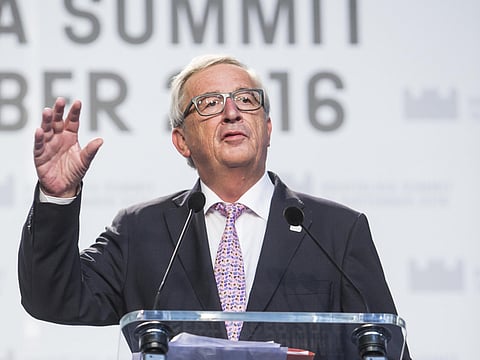Juncker’s bold speech has shown how little damage Brexit will do to the EU
The European Commission president stresses the strength of the bloc economies working in harmony and Britain’s absence won’t change that

‘You aren’t half as important as you think you are.” That was the implicit message for Britain in the state of the European Union (EU) address by European Commission President Jean-Claude Juncker. It was a welcome signal for European citizens and politicians exasperated by British indecision and outright incompetence post-referendum. But it was a message unlikely to even register with all those pundits and politicians in Britain still convinced that the EU needs the United Kingdom more than vice versa.
Modelled on the rather more showily delivered American version, the state of the EU speech marks the beginning of the political season in Brussels. With Britain’s EU referendum vote less than three months ago, it naturally contained a number of allusions to British politics. Juncker stated that Europeans face “the unhappy prospect of a member leaving our ranks”. This he “respected” and “regretted”, as he highlighted the rise in hate crimes against Europeans in Britain since the Brexit vote. Since the penny does not seem to have dropped yet, Juncker reiterated that there is no way the UK can end up with a better deal post-Brexit than it enjoyed as a member.
But these were a handful of remarks scattered around a 6,000-word speech that took a good 50 minutes to deliver. Juncker wanted to address the concerns that actually bother Europeans: Refugees, terrorism, economic stagnation, a dysfunctional Eurozone architecture and Russian expansionism. Add to that the real possibility of chaos in Turkey, of EU-phobe Marine Le Pen winning the French presidential election and of a Donald Trump presidency blowing up Nato and it should be clear that Brexit is somewhere on page two or three of the EU priority list. In fact, the prospect of Brexit seems to have helped the EU at least in the short term, with a number of countries seeing an unexpected surge in support for the EU. In the words of prominent German member of the European parliament, Manfred Weber: “Many people are now in favour of the EU [after the Brexit vote]. In Germany, we have not had these results since the 1970s.”
Meanwhile, in the Netherlands — the country often held up by Brexiteers as the next to leave — all major parties say they want to reform rather than leave the EU. It is only Geert Wilders’ PVV party that actually wants to exit. He currently polls at just under 20 per cent.
Medical science uses the word “crisis” for the point where a patient either irrevocably collapses or turns the corner towards recovery. On the basis of Juncker’s speech, this is the stage where the Commission now feels that the EU and the Eurozone find themselves. Following the speech, Vivien Pertusot from the French Institute for International Relations called them the polycrises: Urgent and potentially devastating crises occurring simultaneously and often amplifying or feeding on one another while driving member states apart.
“Never before have I seen so little common ground between our member states,” said Juncker, himself an EU veteran like few others. The EU is in greater danger than ever before, he continued, with greater levels of selfishness, nationalism and parochialism.
Yet, Juncker also slipped in good news of the sort that somehow rarely reaches the mainstream British press. There had been one million jobs created in Spain over the past three years, and seven million more elsewhere. Public deficits are, on an average, now below 2 per cent across the Eurozone — down from a terrifying 6.3 per cent in 2009. Juncker might have added the Eurozone’s healthy current account surplus, meaning it continues to export more than it imports. This is a stark contrast to the United States and Britain — two nations that are becoming ever more indebted because they buy more from foreign countries than they sell.
Easily, the most refreshing element in the speech, at least for those who have had to endure the Brexit “debate”, was Juncker’s emphasis on realism. Where Brexiteers continue to indulge in narcissistic fantasies about getting the best of all worlds from the EU while making Britain a world power again, Juncker struck a very different tone. Insisting that “solidarity is the glue that holds the union together”, he pointed out that Europeans today make up 8 per cent of the world population. In 2050, that will be down to 5 per cent. “By then, you would not see a single EU country among the top world economies,” Juncker went on. “But the EU together? We would still be topping the charts.”
To which he might have added: ‘And that is true with or without Britain.’
— Guardian News & Media Ltd
Joris Luyendijk is the author of Swimming with Sharks: My Journey Into the World of the Bankers and the former writer of the Guardian’s Banking Blog, which looked at finance from an anthropological perspective.



